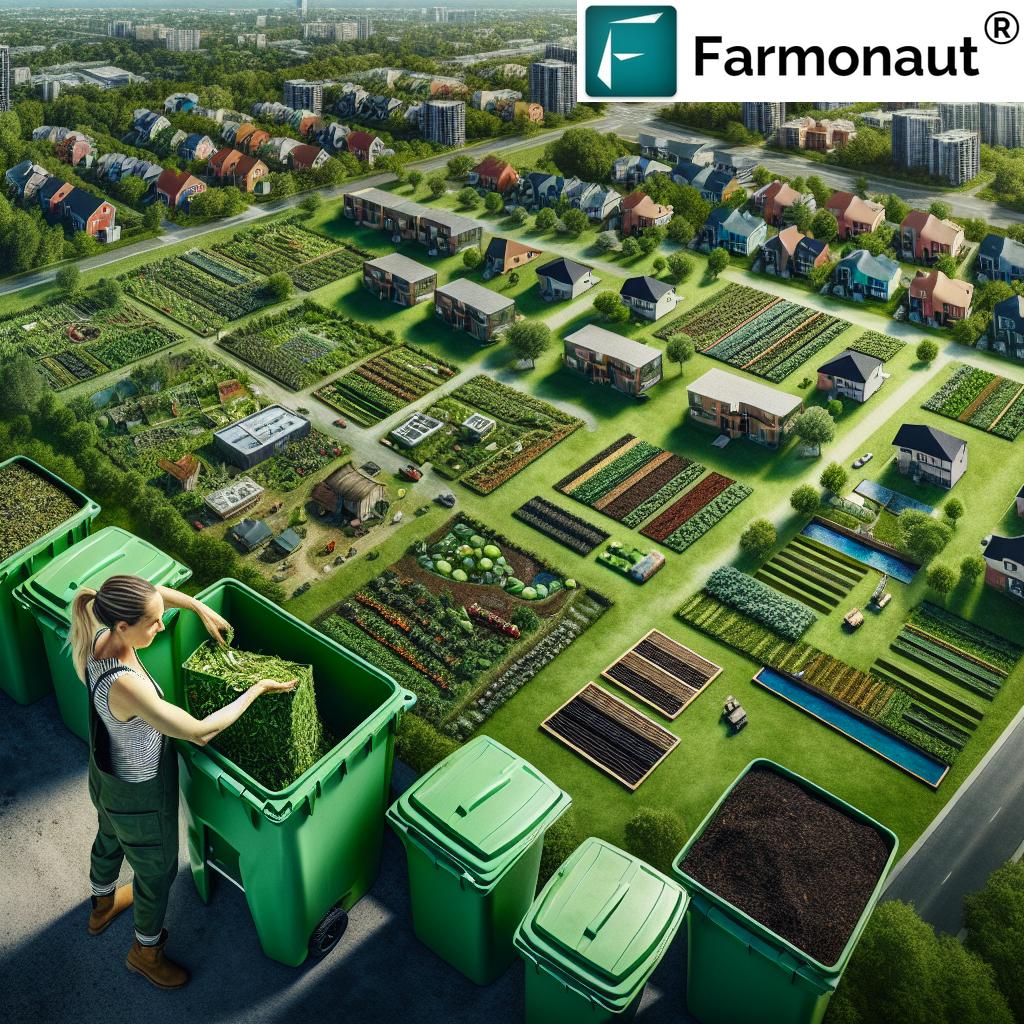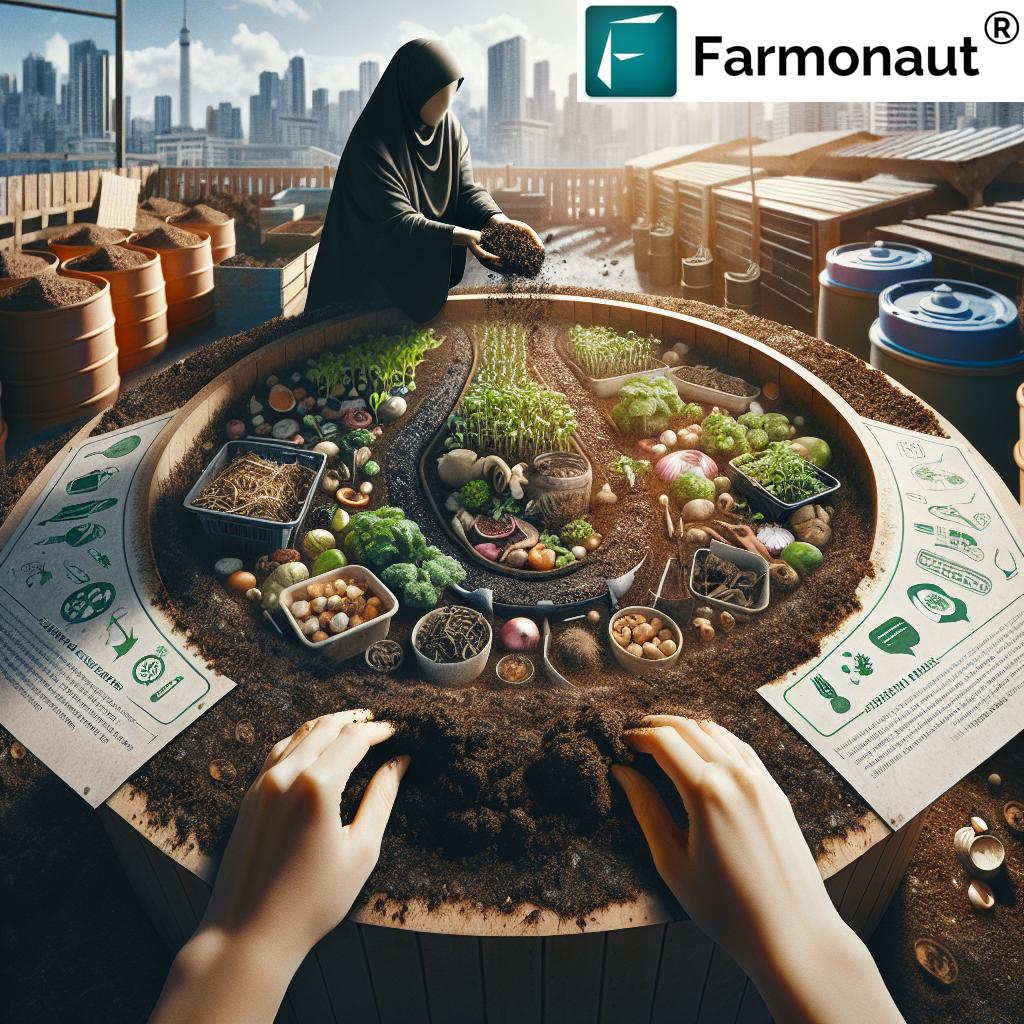Revolutionizing Urban Farming: Portage’s Innovative Food Waste to Soil Program Boosts Sustainable Agriculture

“Portage’s innovative food waste program aims to reduce household waste by up to 30% through community park collection bins.”
In the heart of Michigan, a groundbreaking initiative is taking root that promises to transform the way we think about food waste management and sustainable agriculture practices. The city of Portage is set to launch an innovative pilot program that not only addresses the pressing issue of household waste but also paves the way for a greener, more sustainable future. As we delve into the details of this exciting project, we’ll explore how this Midwestern city is setting an example for eco-friendly city initiatives across the nation.
The Genesis of Portage’s Green Revolution
Starting January 6, 2025, Portage residents will witness the dawn of a new era in urban farming solutions. The city has partnered with My Green Michigan to introduce a pioneering food waste to soil program that aims to revolutionize how we handle our organic waste. This initiative is not just about waste reduction; it’s a comprehensive approach to sustainable landscape management that could reshape our urban environments.
At its core, the program is beautifully simple: residents can drop off their food scraps in dedicated green collection bins located throughout the city’s parks. These lime green, 64-gallon bins will serve as the cornerstone of this community composting project, transforming what was once considered waste into a valuable resource for our landscapes.
How the Program Works
- Collection: My Green Michigan will service the bins every other Tuesday, ensuring a regular and reliable collection schedule.
- Processing: The collected food waste will be industrially composted, turning scraps into nutrient-rich soil.
- Distribution: The resulting compost will be sold at Hammond Farms, a landscape supply company in Dimondale, about 70 miles from Portage.
This closed-loop system exemplifies the principles of green waste recycling, where every element of the process contributes to a more sustainable future. By turning food scraps into valuable soil, we’re not just reducing waste; we’re actively contributing to the health of our local ecosystems.
The Environmental Impact
The potential environmental benefits of this program are substantial. By diverting organic waste from landfills, we can significantly reduce methane emissions, a potent greenhouse gas. Moreover, the creation of nutrient-rich compost supports sustainable agriculture practices and enhances soil health, which is crucial for urban farming initiatives.
As we consider the broader implications of this program, it’s worth noting how technology is playing a role in advancing sustainable agriculture. For instance, platforms like Farmonaut are revolutionizing farm management through satellite-based solutions, complementing on-the-ground efforts like Portage’s composting initiative.
Community Engagement and Education
The success of this organic waste collection program hinges on community participation. Portage officials have designed the initiative to be as user-friendly as possible:
- No fees for participation
- Open to all residents and employees of Portage
- Flexible container options for collecting scraps at home
- Tips for storing scraps in the freezer to minimize odors
Education plays a crucial role in the program’s success. The city is committed to informing residents about what can and cannot be composted. Acceptable materials include various food scraps, while items like glass, metal, plastic, pet waste, and yard waste are prohibited.
Funding and Future Prospects
The one-year pilot program is funded by $11,460 allocated in the city’s 2024 general fund budget. This investment in environmental conservation in agriculture demonstrates Portage’s commitment to sustainability. The program is set to run until December 2025, during which city officials will assess its effectiveness and consider potential expansions.
“The city’s composting initiative could potentially divert over 1,000 tons of organic waste from landfills annually.”
Comparison: Traditional Waste Management vs. Portage’s Innovative Program
| Aspect | Traditional Waste Management | Portage’s Innovative Program |
|---|---|---|
| Waste Destination | Landfill | Community Composting |
| Environmental Impact | High Carbon Footprint | Reduced Emissions |
| Community Involvement | Limited | Active Participation |
| Resource Generation | None | Nutrient-Rich Compost |
| Landfill Usage | High | Reduced |
| Soil Health Impact | None | Enhanced |
| Urban Farming Support | Limited | Significant |
This comparison clearly illustrates the advantages of Portage’s innovative approach to waste management and its potential to transform urban ecosystems.
The Role of Technology in Sustainable Agriculture
While Portage’s program focuses on ground-level waste management, it’s important to recognize the role of technology in advancing sustainable agriculture. Companies like Farmonaut are at the forefront of this technological revolution, offering satellite-based farm management solutions that complement initiatives like Portage’s composting program.
Farmonaut’s platform provides valuable services such as real-time crop health monitoring and AI-based advisory systems. These tools can help farmers optimize their use of resources, including the compost generated from programs like Portage’s, further enhancing the sustainability of agricultural practices.
The Broader Impact on Urban Farming
Portage’s initiative is more than just a waste management solution; it’s a catalyst for urban farming. By providing a steady supply of high-quality compost, the program supports local gardeners and urban farmers in their efforts to grow fresh, healthy produce within city limits. This aligns perfectly with the growing trend of urban agriculture, which seeks to bring food production closer to consumers, reducing transportation costs and carbon emissions.

Urban farming initiatives benefit greatly from technological advancements in agriculture. For instance, Farmonaut’s satellite and weather API can provide urban farmers with crucial data on weather patterns and soil conditions, helping them make informed decisions about planting and harvesting.
Challenges and Solutions
While the program holds great promise, it’s not without its challenges. Some potential hurdles and their solutions include:
- Odor Control: By encouraging freezer storage and regular bin servicing, the city aims to minimize odor issues.
- Contamination: Clear guidelines and ongoing education will help ensure only compostable materials are deposited.
- Participation Rates: The city plans to monitor usage and adjust bin locations to maximize convenience and participation.
These proactive measures demonstrate Portage’s commitment to the program’s success and its willingness to adapt as needed.
The Future of Sustainable Cities
Portage’s innovative program is a glimpse into the future of sustainable urban living. By closing the loop on organic waste, cities can reduce their environmental impact while creating valuable resources for local agriculture. This model has the potential to inspire similar initiatives across the country, leading to a network of cities committed to sustainable waste management and urban farming.
As we look to the future, the integration of programs like Portage’s with advanced agricultural technologies will be crucial. For example, Farmonaut’s API developer documentation provides a roadmap for how satellite data can be integrated into urban farming practices, further enhancing efficiency and sustainability.
Conclusion: A Step Towards a Greener Future
Portage’s food waste to soil program represents a significant step towards more sustainable and resilient cities. By turning a problem (food waste) into a solution (nutrient-rich soil), the city is setting an example for communities across the nation. This initiative, combined with technological advancements in agriculture, paints a promising picture of our urban future – one where waste is minimized, resources are optimized, and communities are more connected to their food systems.
As we move forward, it’s clear that the success of such programs will rely on the active participation of community members and the continued innovation in agricultural technology. Together, ground-level initiatives like Portage’s composting program and high-tech solutions like Farmonaut’s satellite-based farm management tools are paving the way for a more sustainable and food-secure future.
FAQs
- Q: Who can participate in Portage’s food waste program?
A: The program is open to all residents and employees of Portage at no charge. - Q: What items can be composted in the program?
A: Various food scraps are accepted, but glass, metal, plastic, pet waste, and yard waste are prohibited. - Q: How long will the pilot program run?
A: The program is set to run for two years, until December 2025. - Q: Where can I find the collection bins?
A: There will be 10 lime green, 64-gallon bins positioned in Portage parks. - Q: How often are the bins serviced?
A: My Green Michigan will service the bins every other Tuesday.






